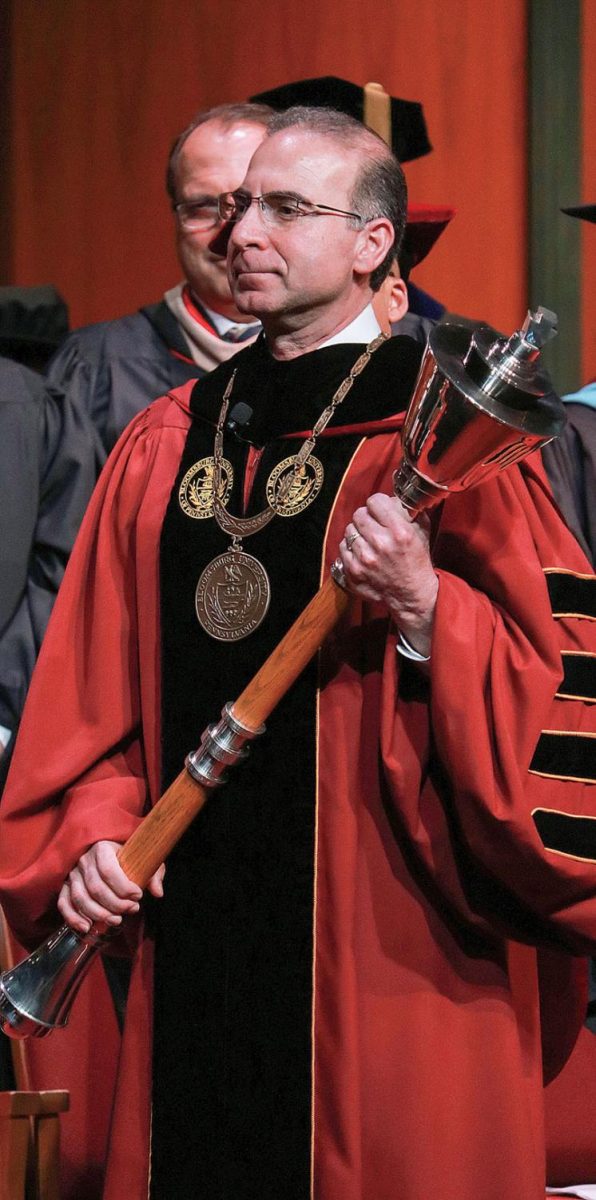“I wish not to change your beliefs, I want to challenge them. I want to question why you believe what you believe. I hope you get uncomfortable with the things I say because if you do, that means something is not sitting right with you.”
Speaker, actor and activist Monti Washington was guest speaker on Tuesday night for BU’s No Hate Week with his talk about “Which Lives Matter?” He began his talk with a powerful poem/rap that grabbed the audience’s attention as he walked through the aisle to the front of the room.
After introducing himself, he began to tell his story.
“My mother was addicted to crack and was a prostitute. I was homeless, eating out of trashcans and sleeping in parks during my childhood. I was in 12 group homes in the matter of three years. My first mother left me for drugs, second nearly beat me to death, and the third would lock me up in a room for 23 hours of the day,” said Washington. “My point is that you would have never guessed that I went through all of that because I don’t look like my story. We don’t have to look like our story because we are greater than our story.”
Washington then stressed how the main problem in this country is race.
“The core is race. Race is a false narrative. There is no scientific evidence that there are different human races. It was created because it is easier to conquer, enslave and control when one race is superior to the rest. The ideology has been used to oppress because of pigmentation, because of melanin,” said Washington.
Washington then explained what happens in the false narrative of race: dismiss, deny and divide.
“We dismiss because of stereotypes and labels,” said Washington. “If I label you, I negate you. If you label me, you negate me. We deny because we believe one experience of one is one for all and when we dismiss and deny we then divide.”
He then transitioned into the concept of privilege.
“Privilege does not mean pain, privilege does not mean shame, we all have privilege. As a black man, I have a certain privilege because I am a man and I do not have to worry about the things that women go through every day.”
Washington used religion as an example of privilege.
“If you are a Christian, you have a privilege in this country. You can pray out in public and no one will say anything to you, but if a Muslim would do that, people will feel upset and uncomfortable.”
He then used race as another example.
“You get to have the benefit of the doubt if you are white. Tamir Rice, 12-year-old kid had a toy gun at a park and was shot and killed by the police. The first thing the media did was bring his parent’s criminal records. What does that have to do with anything?” said Washington. “Now the shooter in Las Vegas was called a lone wolf and many names except a terrorist. That is privilege. If anyone with a darker complexion did it, he would be labeled as a thug, criminal, the list goes on.”
Washington wanted to send a message about the importance of interaction to solve today’s problems in this country.
“Almost all the people that call all Muslims terrorist never had an interaction with someone from the Middle East a day in their life. A news station in Nebraska has a media coverage of 70% of African Americans committing crime. When really the rate of crime is 30%, so more than doubled the coverage is on that. The population of blacks in Nebraska is 4.8% so obviously people that live there will assume that all black people are criminals if that’s all they see on the news. I encourage you to have these interactions. How can you not have these assumptions if you don’t?”
Washington stated that college is the best place for people to connect and interact with someone who looks different than them. He made everyone in the audience write down things that they have been labeled as because of their race, gender, religion, social economic status and sexuality. He then called on students to read their card and many had similar labels.
“We all have similarities with our suffering. Compassion is to suffer with someone and we need to have compassion for one another. Some believe that we connect through success but I believe that we connect through our mess. “
He then ended the event with an activity called “I’m the shit.”
“My foster mother use to always tell me that I wasn’t shit, so I had to tell myself why I was the shit as I got older.”
He called people from the audience and made eight students stand in the front of the room and name three reasons why they’re the shit as the audience encouraged them. The speech ended with positive energy as students waited after to take a photo with him, have a conversation and to buy his book “From the Streets to the Stage.”
“We have to always come from a place of love, that’s the answer to everything,” said Washington. “We have to embrace our diversity”
















